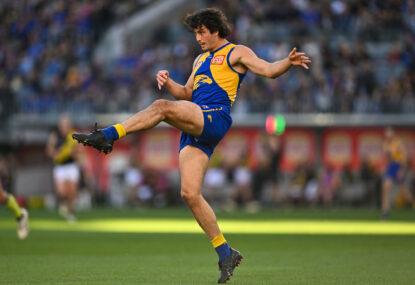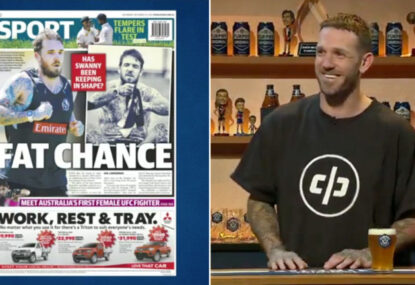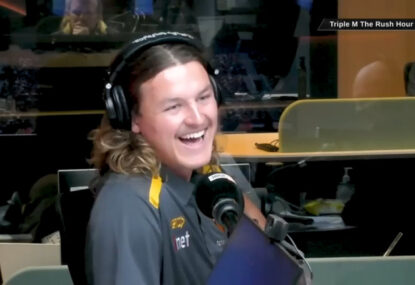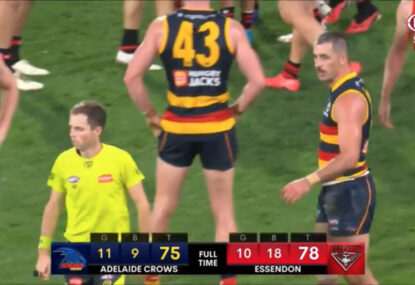The AFL’s free agency system has once again received ample coverage in the press over the past week, and none of it positive.
Geelong coach Chris Scott voiced his disapproval, claiming free agency flew in the face of the AFL’s other attempts to equalise the league.
Adelaide forward Tex Walker also offered his two cents, saying there would be more loyalty without free agency, and Fox Footy personality David King has often voiced his concerns that it would lead to a “rich get richer, poor get poorer” type of league, a la some European football leagues.
But upon further examination, these arguments – and others against free agency – don’t appear to hold up.
Scott claims his Geelong side has “been attacked pretty hard” by free agency, citing Gary Ablett and Harry Taylor as examples.
Firstly, Ablett left the Cats for the Gold Coast the summer before free agency was introduced. At their inception, both the Suns and Greater Western Sydney were allowed to sign out-of-contract players, of which Ablett was one.
And the last time I checked, Taylor was still running around in the blue and white hoops – alongside recently acquired free agent Jared Rivers.
Walker’s assertion that free agency leads to an erosion of loyalty is baffling. Had Lance Franklin or Brendan Goddard wanted to remain at Hawthorn and St Kilda, they’d still be there. It’s just now players actually have a choice – the same choice nearly all professionals have – to ply their trade where they want to.
A prime example of the nonsensical system in place prior to free agency was Jade Rawlings. Having a contract dispute at Hawthorn, Rawlings wanted out – specifically, to the Kangaroos to play with his brother Brady. The Kangas wanted him. But to get to Arden Street, the out-of-contract Rawlings had to enter the pre-season draft, where he was promptly drafted by the Western Bulldogs with the number one pick.
Now, comparing sports leagues to other workplaces is always sketchy, but there can few other industries where an employee and employer are in mutual agreement to commence a working relationship, and another company can force the employee to instead work for them.
King says free agency will lead to strong clubs getting stronger, but this seems to conveniently forget one aspect of the AFL which differentiates it from many other major sports leagues: the AFL has a salary cap.
If players are now as greedy as many fans claim, and base their free agency decisions solely on money, this would lead to a more even competition as each team has the same cash to spend on players as anyone else. And before you bring up the cost of living allowance, it’s spread evenly among players. Buddy’s not in Sydney because Sydney can offer him an extra few grand per year.
Yes, players may opt for teams that are high on the ladder for a shot at the flag. But to say only wealthy sides will make up the top sides in the coming years doesn’t sit well.
The Kangaroos barely have two cents to rub together but will make the eight (and, really should have given the top four a shake considering their best form). And anyone who has seen the cash-strapped Bulldogs this year knows they will be at the pointy end of the ladder soon enough.
Which brings us to another point – some say free agency doesn’t reward clubs for drafting good players if said players leave. But players aren’t eligible for free agency until they’ve played at least eight years. The Bulldogs don’t have to worry about the sharks circling for Jack McRae or Marcus Bontempelli, for example.
And eight years is plenty of time for a club to get value from a draftee. Franklin had won a Coleman medal, made two grand finals and won a premiership with the Hawks in his first eight years, Goddard had played in three grand finals for the Saints. That’s fair reward right there.
Should a young gun want to leave before their eight years? It’s just like the good old days free agency critics seem so enamoured with: the player’s original club can formulate a trade to get something in return.
Unlike other leagues, clubs more often than not do get something in return for losing their free agents anyway. Lose someone of any sort of standing and you’ll get a draft pick. Hell, Collingwood even got a first round pick for a hobbled Dale Thomas.
When free agency came about, much of the reasoning from the AFL Players Association revolved around affording players who may be finished at one club the chance to play on at another. And while superstar moves like Franklin and Goddard might steal the newspaper inches, there are far more instances of bit-part players extending their careers.
Of all of the free agents to leave, one would only cite Franklin, Goddard and – at a stretch – Eddie Betts and Troy Chaplin as players who their respective sides were loathe to lose.
This is the remaining list of players who have moved clubs due to free agency: Danyle Pearce, Chris Knights, Brent Moloney, Quinten Lynch, Shannon Byrnes, Tom Murphy, Rivers, Clinton Young, Jonathan Simpkin, Tom Gillies, Dylan Roberton, Nick Lower, Matthew White, Colin Sylvia, Xavier Ellis, Daniel Cross, Jeremy Laidler, Luke McGuane, Nick Dal Santo, Dylan Addison, Tony Armstrong, Robin Nahas, Aidan Riley and Tom Derickx.
All were either unrestricted, (meaning they’d been at their clubs for at least eight years of service) or restricted free agents (meaning their clubs could have matched any offer made on them). Or they had been delisted, meaning they would have normally had to nominate for the draft and risk going somewhere completely random, despite not being a rookie or contractually bound to a particular club.
So everyone, take a breath and chill. Free agency is here until at least 2016 and is still in its infancy. Let’s at least wait for a few years before we start screaming inequality and – when we do look at its effectiveness – let’s actually look at the facts of each case.



































































































